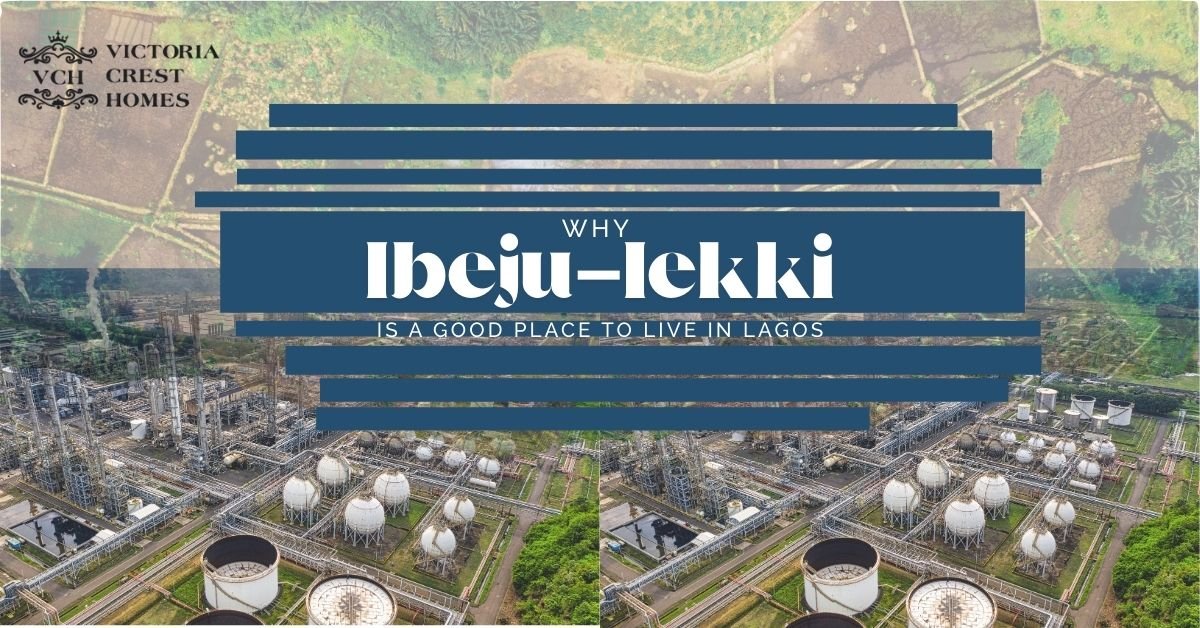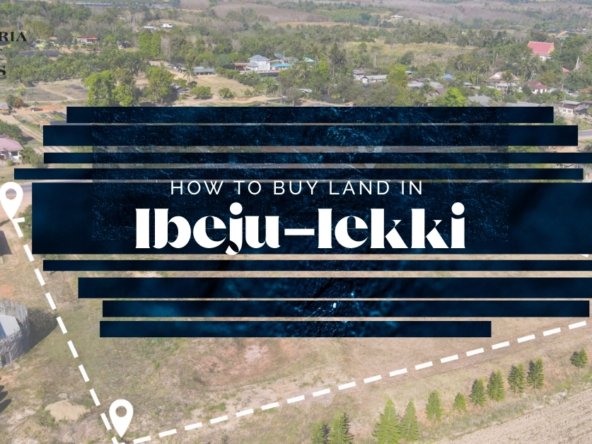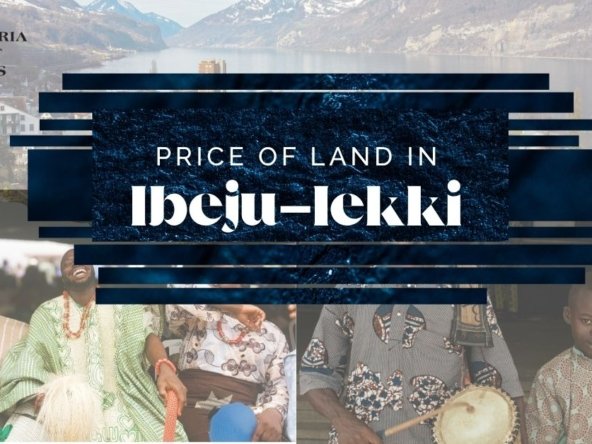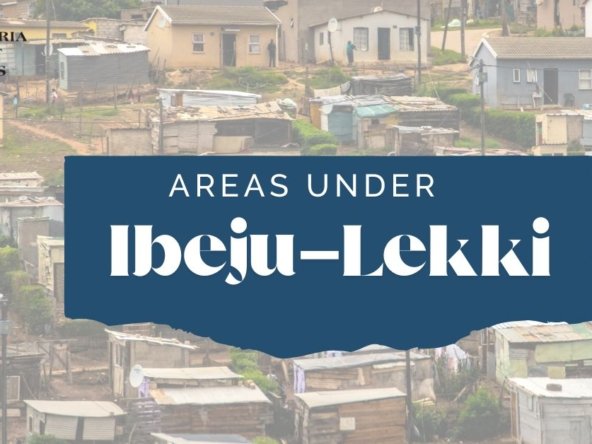In recent years, Ibeju-Lekki has emerged as one of the most talked-about locations in Lagos real estate. Once seen as a quiet outskirt, this fast-developing corridor on the Lekki-Epe axis has captured the attention of investors, developers, and home seekers alike.
With major infrastructure projects like the Dangote Refinery, Lekki Deep Sea Port, and Lekki Free Trade Zone, it’s no surprise that Ibeju-Lekki is now being positioned as the “New Lagos.”
But beyond the hype and investment buzz, a key question remains:
Is Ibeju-Lekki really a good place to live? Yes it is, and below are the whys.
In this article, we’ll explore the livability of Ibeju-Lekki in 2025. We will rate our answer based on
– location
– infrastructure
– cost of living
– benefits and challenges of living in Ibeju Lekki
So that whether you’re considering a move or just curious about the area, this guide will give you a clear, up-to-date overview of living in Ibeju-Lekki.
Ps. If you’re looking for a house to buy in Ibeju-Lekki, click here to book a free private inspection with Ms. Debby or our other marketing execs.
Where Is Ibeju-Lekki Located?
Ibeju-Lekki is a rapidly growing area situated along the Lekki-Epe Expressway in Lagos State, Nigeria. Geographically, it lies to the east of Lekki and Ajah, stretching all the way toward Epe.
It shares close proximity to key Lagos suburbs like Awoyaya, Sangotedo, Lakowe, and Abijo GRA, making it strategically positioned for both residential and commercial growth.
What sets Ibeju-Lekki apart is its easy accessibility. The Lekki-Epe Expressway and on-going coastal road connects the area seamlessly to major business and residential hubs in Lekki Phase 1, Victoria Island, and Ikoyi.
Yet despite many considering relocation, a common question is: Is Ibeju Lekki a good place to live? Why are experts recommending it as the best place to buy land in Lagos? And why are Lagosians flocking to Ibeju Lekki?
Key Reasons People Are Moving to Ibeju-Lekki
Over the past few years, Ibeju-Lekki has evolved from a relatively quiet district into one of the fastest-growing areas in Lagos. The transformation has been driven by several factors that make it increasingly attractive for both investors and prospective homeowners.
Affordable Land and Housing
Compared to other parts of Lagos like Lekki Phase 1 or Victoria Island, land and housing in Ibeju-Lekki are significantly more affordable.
This makes it an appealing option for first-time buyers, young families, and middle-income earners looking to own property without breaking the bank.
Massive Government and Private Sector Development
Ibeju-Lekki is home to some of Nigeria’s largest ongoing developments, including the Dangote Refinery, Lekki Deep Sea Port, and the Lekki Free Trade Zone.
These mega-projects are expected to create thousands of jobs, attract multinational companies, and drive sustained economic growth in the region.
Promising Future Potential
The combination of industrial, residential, and commercial growth in Ibeju-Lekki paints a bright future for anyone considering long-term living or investment.
For many, this future-forward development helps answer the key question: Is Ibeju Lekki a good place to live? With all signs pointing to rapid urbanization and value appreciation, the answer leans heavily toward yes, as mentioned earlier.
Improved Road Networks and Infrastructure Plans
Access to Ibeju-Lekki is becoming smoother, thanks to ongoing upgrades along the Lekki-Epe Expressway and proposed infrastructure such as the Fourth Mainland Bridge.
Better roads, improved drainage, and new bridges will reduce travel times and further enhance the livability of the area.
Quality of Life in Ibeju-Lekki
When considering the quality of life in Ibeju-Lekki, several appealing features stand out, especially for those seeking a quieter, more spacious alternative to the busy core of Lagos.
– Peaceful Environment and Less Congestion
Unlike the densely packed neighborhoods of Lagos mainland or Victoria Island, Ibeju-Lekki offers a more serene, low-density lifestyle. The roads are less congested, the noise levels are lower, and the overall atmosphere is ideal for raising a family or retiring in comfort.
– Natural Beauty and Recreational Access
One of the unique advantages of living in Ibeju-Lekki is its proximity to beaches, resorts, and lush green spaces. Places like Eleko Beach provide residents with easy access to leisure and relaxation, all within a short drive.
– Strong Community Lifestyle
The area is gradually evolving into a self-sustaining residential hub, with an increasing number of schools, hospitals, markets, churches, and mosques. The sense of community is growing, and more gated estates and modern housing options are being developed to support family-friendly living.
So, is Ibeju Lekki a good place to live? If you value peace, space, nature, and long-term growth, the answer is likely yes, especially for those who can look beyond short-term infrastructure gaps to the long-term benefits of living in this emerging part of Lagos.
Best Residential Areas in Ibeju-Lekki

Ibeju-Lekki is made up of several fast-developing neighborhoods, each with its own unique appeal. Whether you’re a first-time homebuyer, investor, or looking to relocate, these areas offer great potential for modern living and future growth.
So, is Ibeju Lekki a good place to live? The answer becomes clearer when you explore the best areas in Ibeju-Lekki that are already drawing the attention of smart investors and families.
I. Eleko
Known for its proximity to the Lekki Free Trade Zone and Eleko Beach, Eleko is ideal for those looking to live near both business hubs and recreational spots. It’s rapidly transforming with several estate projects already underway.
II. Awoyaya
Located close to major estates and schools, Awoyaya is one of the more established Ibeju-Lekki neighborhoods. It offers a blend of affordability and convenience, with growing access to healthcare, education, and shopping.
III. Abijo GRA
Abijo GRA is one of the most organized and gated communities within Ibeju-Lekki. With tarred roads, private schools, and access to supermarkets and hospitals, it’s perfect for families seeking a structured and comfortable lifestyle.
IV. Lakowe
Lakowe is home to the famous Lakowe Lakes Golf and Country Estate, making it one of the most luxurious parts of Ibeju-Lekki. The area is calm, well-planned, and suitable for both high-end residential living and holiday homes.
V. Alatise
Positioned close to the Dangote Refinery and key development zones, Alatise is still growing but holds strong future potential for both residential and commercial real estate. It’s ideal for early movers and investors.
VI. Sangotedo (Fringe Area)
While technically on the edge of Ibeju-Lekki, Sangotedo benefits from more advanced infrastructure and access to LBS, Shoprite, good schools, and hospitals. It offers a blend of modern amenities with proximity to the Ibeju-Lekki development corridor.
Each of these Ibeju-Lekki neighborhoods offers different lifestyle benefits depending on your needs, whether that’s convenience, affordability, investment potential, or long-term family living. When people ask, “Is Ibeju Lekki a good place to live?” these communities provide strong evidence that it is.
Cost of Living in Ibeju-Lekki
The cost of living in Ibeju-Lekki is one of the major reasons people are relocating to the area. In 2025, it remains significantly more affordable than places like Lekki Phase 1 or Ajah, making it ideal for middle-income earners and first-time homeowners.
Housing prices in Ibeju-Lekki vary by location, but on average, rent for a 2-bedroom apartment ranges between ₦600,000 and ₦1.2 million annually. Land prices are still relatively low in developing areas, offering great opportunities for early investors.
Basic expenses like electricity, water, transportation, security, groceries, and tuition are also manageable, especially in gated estates with dedicated services. Overall, Ibeju-Lekki provides one of the best balances between lifestyle and affordability in Lagos today.
Challenges of Living in Ibeju-Lekki
While Ibeju-Lekki presents numerous opportunities for homeownership and long-term investment, it’s important to also consider the realities and challenges of living in the area. Like many fast-growing districts, development comes with a few growing pains.
Distance from Lagos Central Business Districts
Another concern for some is Ibeju-Lekki’s distance from key business and commercial hubs like Victoria Island, Ikoyi, and Ikeja. Daily commuting can take time, especially during peak traffic hours.
However, this distance also contributes to the quieter, more suburban feel that many families and retirees appreciate.
Pockets of Underdeveloped Areas
While certain neighborhoods like Abijo GRA and Lakowe are rapidly modernizing, others still have incomplete infrastructure such as untarred roads, unreliable power supply, and limited public transport.
These downsides of living in Ibeju-Lekki are improving with ongoing private estate developments and government-backed projects, but they remain a consideration for anyone looking to move in immediately.
Who Should Consider Living in Ibeju-Lekki?
As Ibeju-Lekki continues to evolve into a major residential and investment hub in Lagos, it’s attracting a wide range of people with different needs and lifestyles.
So, if you’re asking, “Should I move to Ibeju-Lekki?”, here’s a breakdown of who the area is best suited for.
1. First-Time Homeowners
If you’re looking to own your first home in Lagos without the high price tag of Lekki Phase 1 or Ikoyi, Ibeju-Lekki is an excellent starting point. It offers affordable options, access to developing infrastructure, and the potential for long-term property value growth.
2. Young Families
For families seeking space, security, and a more peaceful environment to raise children, Ibeju-Lekki provides a calm, suburban lifestyle.
With more schools, parks, and gated estates emerging, it’s becoming increasingly family-friendly.
3. Retirees
The relatively quiet setting, lower living costs, and access to beaches and green spaces make Ibeju-Lekki a great place for retirees who want to enjoy a slower pace of life while staying connected to city amenities.
4. Real Estate Investors Seeking Rental Income
Thanks to the influx of industrial and commercial developments, rental demand is expected to rise sharply in the coming years. Investors who get in early stand to benefit from increased property values and rental yields.
5. Remote Workers and Digital Nomads
With more people working from home or running location-independent businesses, Ibeju-Lekki offers a peaceful and affordable alternative to the hustle of city life. Many new developments come equipped with reliable internet, power backup, and serene work-friendly spaces.
Final Verdict: Is Ibeju-Lekki a Good Place to Live in 2025?
When weighing the pros and cons of life in Ibeju-Lekki, it’s clear that the area offers huge promise, but with some trade-offs.
Pros of Living in Ibeju Lekki
- Affordable land and housing, especially for first-time buyers
- Rapid infrastructural and commercial development (e.g., Dangote Refinery, Lekki Deep Sea Port)
- Peaceful and spacious environment, ideal for families and retirees
- High future value, making it a smart long-term investment
- Access to natural attractions like beaches and resorts
Cons of Living in Ibeju Lekki
- Distance from Lagos commercial hubs, which can affect daily commutes
- Ongoing construction and temporary inconvenience from development projects
- Pockets of underdeveloped areas still lacking basic infrastructure
So, is Ibeju-Lekki a good place to live in 2025?
For individuals and families looking beyond immediate city-center convenience and focusing instead on affordability, space, and future potential, the answer is a confident yes.
While the area is still growing and presents a few challenges, the trajectory points toward becoming one of Lagos’ most livable and valuable suburbs in the near future.
Frequently Asked Questions (FAQs)
- Is Ibeju-Lekki safe to live in?
Yes, Ibeju-Lekki is generally safe to live in, especially within gated estates and well-developed neighborhoods. While some areas are still growing and may lack full security infrastructure, many private developers offer 24/7 security and controlled access to their communities.
- How much does it cost to live in Ibeju-Lekki?
The cost of living in Ibeju-Lekki is relatively low compared to central Lagos. Rent for a 2-bedroom apartment ranges from ₦600,000 to ₦1.2 million annually, while land prices vary based on location and title. Utilities and daily expenses are also more affordable than in Lekki Phase 1 or Victoria Island.
- Are there schools and hospitals in Ibeju-Lekki?
Yes, Ibeju-Lekki has a growing number of private schools, primary healthcare centers, and general hospitals. As the area develops, more educational and medical facilities are being established to meet residents’ needs.




